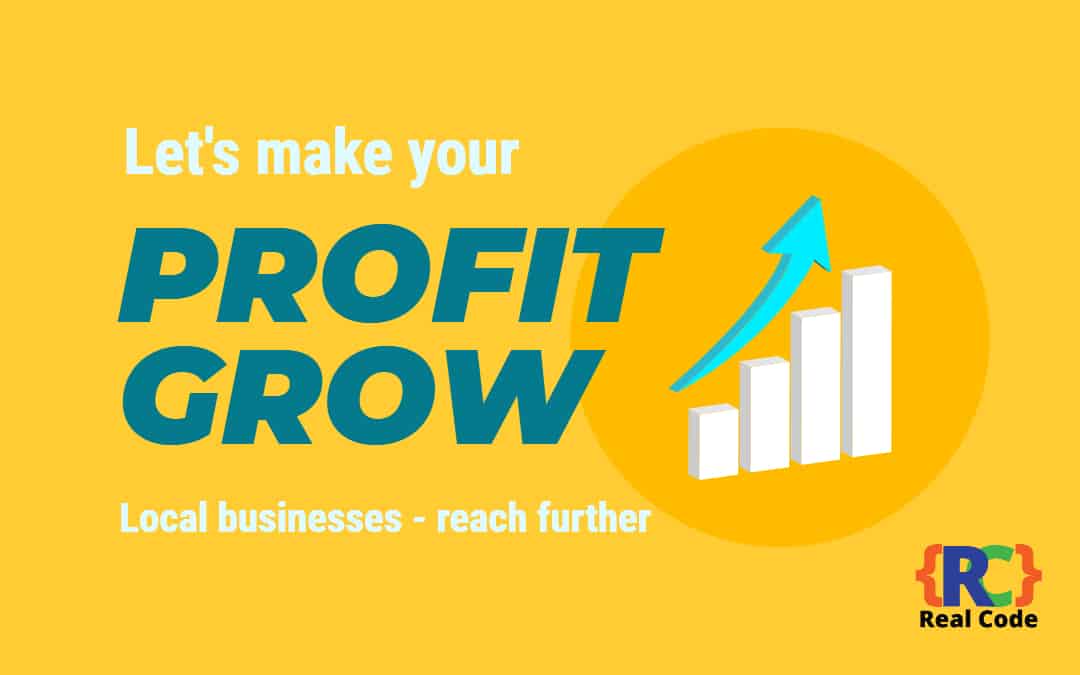According to a recent study, 60% of small UK businesses (those with less than five employees) still don’t have a website at the end of 2016. The majority of these were local small businesses. Some owners didn’t think the size of their business needed a website, whilst others listed cost and lack of time as reasons being a barrier to an online presence.
Instead, their owners rely on word or mouth, local paid advertising and listings sites such as Yellow pages in order to generate new business. However, by not having a website, many are missing out on a wide range of business opportunities, spending more on traditional advertising than they would on running a website and losing a great deal of business in the meantime. For those who haven’t yet made the decision, this post will explain seven key reasons why your local business needs a website.
1. Sell your goods or services further afield
Before the internet went mainstream, most local businesses would only have competition from other companies in the same local town. If someone wanted to buy a TV or a get their car repaired there might have been only a handful of places they could go. Today, people can go online and can get their goods or services from anywhere either national or global.
For local businesses, this presents both a threat and an opportunity. It’s a threat because many customers will now look online rather than coming to visit your shop, so your local market will, effectively, have shrunk, putting your business at risk. However, the internet also offers the opportunity for you to sell your products and services anywhere too – so what you lose locally, you can more than compensate for by selling further afield. If you sell curtains in Derby, there’s no reason why you can’t sell them in Dunstable too.
However, you can only do this if you have a channel from which to sell and that is why a website is so important. It’s a shop front to a much wider marketplace.
2. Improved effectiveness of local business directory listings
Many local businesses list their company on sites like Yellow pages and feel this is the only web presence they need. However, showing your phone number, address and opening hours isn’t good enough. What business owners fail to consider is how people behave when using a directory site.
What people do when searching Yellow pages or Thompsons, is find your business listing and then immediately look for the link to your website. As people are not inclined to make a phone call when using the internet, if you don’t have a website, rather than call you, they’ll look for a business that does have a website. Even if your business is the obvious best choice, they’ll only come back to find your number if they fail to find a website that’s got what they are looking for. Your business will show up higher in Google if the details of your office are presented consistently.
What this means is that if you don’t have a website, a significant number of the people who do find you on a directory listing aren’t going to bother getting in touch and the investment you are putting into your directory listing is largely being wasted.
3. Communication with both new and existing customers
Websites are not just for selling your products and services, they are also a way to build relationships with customers so that they stay loyal to your business. Once you have a website, you have a means of maintaining communication with them over the long term and can use this to significant advantage.
You can use your website to send newsletters, advertise events or sales, offer discounts or voucher codes, run competitions and much more. These are all ways that help generate new business and keep existing customers coming back.
What’s more, it’s been proved that even if a customer can find something cheaper elsewhere, they are much more likely to stay with a business that they have built a relationship with – even if that is an online relationship.
4. Showcase your products or services
Of course, if you do have a website, not only can you tell people about your products and services you can also show them and even sell them directly from your site.
Modern websites enable you to create portfolios of your best work, so if you are a dress designer, builder or landscape gardener you can let your customers see exactly what the quality of your work is. If you are a retailer, you can create an e-commerce site and sell the products there and then.
Again, the reasons why these elements are important to your business is because of how internet users behave. They expect to be able to see what they are looking for and, if it is for sale, to be able to buy there and then. If they can’t, they’ll look elsewhere.
This is one area where many local retailers fail with their websites: they tell the visitor they stock something but then disappoint them by not giving the opportunity to buy it instantly. If you are sat in your armchair at home and you have the choice between driving to your local store or ordering something without going anywhere, you’ll most likely order online – even if it’s more expensive.
5. Take orders for customers to collect or to be delivered
One way local businesses can benefit from a website is to follow the example of many takeaways. Takeaways often have their menus online and enable customers to choose their meals, pay online and get them delivered to the door. Because they are local, this can be done very quickly.
Customers are now flocking to similar services being offered by many other types of business and not just from retailers. They are using local businesses to change their car tyres, have their ironing collected and dropped off, get their windows cleaned, book cinema tickets, shop for groceries and much more.
These are all ways local businesses can offer customers a much-improved service – but the only effective way of achieving this is through having a website that can offer the service, record the order, take the payment and schedule the appointment or delivery. Whilst this can be done through a phone line and written down in a book – it is more time consuming, less effective and because it’s done over the phone, it’s much less appealing to internet users. It really needs to be offered online.
6. Get feedback from your customers
One of the great things you can do with a website is ask your customers to give you feedback. You can use surveys, ratings and other methods to see exactly what your customers think about your business. This is great for helping your company to improve, whether that’s customer service, products or services, premises, prices, delivery or any other factor which your customers find important.
Giving customers the chance to give anonymous feedback also means you’re more likely to get honest feedback too.
7. Extend your opening hours
If your local business opens from 9 to 5, one of your problems is that by the time your customers get home from work, you’ll have closed for the day. With a website, you can make your business, or at least parts of it, available 24/7.
An e-commerce website can sell products regardless of the time of day, whilst a site offering local services can continue to take bookings after you have gone home. Adding simple contact forms means customers can ask questions or send enquiries which, without a website, they would never have the chance to do.
Real Code also supports the following locations:
Web design Ealing
Web design Crawley
Web design Norfolk
Conclusion
More and more people are using the internet to research and find local services or products and their expectation is that every company will have a website. From reading this article, you will now understand how having a website can benefit your local business in many different ways.
If you run a local business and are considering creating a website, contact us for a fixed price quote.
Contact Us
We partner with many UK businesses helping them get more leads and sales from the internet, be our latest client.

